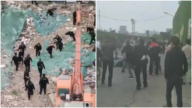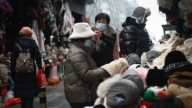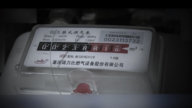【新唐人2013年12月26日讯】年终尽头,中国人民银行24号采取290亿元人民币逆回购操作,期限七天;同一天,上海银行同业拆息再度抽升,其中7天期及14天期拆息升到超过8厘水平,创年内次高。中共当局在资金压力下,向传媒发出警告,禁止报导“钱荒”。专家分析,“钱荒”导致的金融危机将触发中共政权的崩溃。
从12月17号开始,中国银行业市场利率一路全线跳跃飙升;20号,尽管央行连续三天向市场注资3000多亿元人民币,但各大银行对央行公开市场操作的期望继续落空,市场利率接近6月份“钱荒”水平,市场恐慌加剧。
24号,上海银行同业拆息再度抽升,其中7天期及14天期拆息大涨100多点,超过8厘的水平,创年内次高。
东方证券银行业分析师金麟表示,年底银行间流动性压力远超过预期,再加上元旦、农历新年的到来,流动性压力也大增。
据英国《金融时报》引述消息说,中共宣传部门已发出警告,不要炒作银行间市场流动性问题,在某些情况下,还禁止使用“钱荒”二字。
美国南卡罗莱纳大学艾肯商学院教授谢田表示,中国的钱荒从今年6月份开始,不但没缓解,还越演越烈。实际上,很多资金都流到国有企业和中共权贵手中。
美国南卡罗莱纳大学艾肯商学院教授谢田:“中共它每次在刻意的避免某些敏感词汇的时候,都是因为这些词汇揭示了中国以及最深层、最深刻的问题。它(中共)害怕揭示到最关键的问题,这是一个它看来解决不了的问题、中国经济金融的一个死结。”
大陆媒体报导,进入6月以来,中国各地大中城市楼价继续攀升,据中共国家统计局日前公布的数据显示,8月全国70大中城市楼价按年上升8.3%。一线城市,如北京、上海、广州和深圳等四大城市的楼价,按年上涨近20%。同时地王频现,进一步推高楼价。
大陆金融分析师任中道:“钱从哪里来?那些房地产商弄到土地证之后,就去银行贷款,这就归到一个更深层次原因,银行为了获利,把钱放出去,钱都放给了房地产、地方债、地方政府银行、地方政府融资平台,那银行最后就没有钱了,钱都放出去了,所以就钱荒了。”
中国的“钱荒”问题,背后究竟牵扯什么不可告人的秘密?
内蒙耗资50亿打造的“鄂尔多斯”,已成为中国最知名的“鬼城”。
谢田表示,“鬼城”里的铁路、公路、和机场接连推出,带动了地方政府的GDP 和官员的政绩,而出现荒唐的“地王”地价,是因为国企在“竞标”国有土地。当百姓看的眼花撩乱的同时,地方政府卖地的钱,已经进入贪官的口袋。
谢田说,这些建设项目的投资回报率,一般都非常低,甚至为零,而投资收回期又格外的长,这是导致国有商业银行现金紧缺的首要原因。
在此之上,银行官员又和影子银行如信托公司、保险公司、租赁公司、甚至地下钱庄、当铺等机构合谋,利用低价的政策贷款,转手放高利贷,投入理财产品、金融衍生物,迅速以钱生钱、急速获利。大量资金陷入这些领域,这是国有商业银行现金紧缺的另一原因。
谢田:“中共目前最大的问题、中国经济最根本的问题,就是中共的权贵跟中国老百姓在争利,在抢钱,在攫取财富。”
德国媒体认为,中国的银行陷入困境后,很有可能引发本国金融危机。谢田分析,中共政权的崩溃,有可能从“钱”上开始。大陆金融分析师任中道表示赞同,他说,因为中国的政治和经济是紧密相连的,中共政权对银行的强烈控制导致钱荒,以致银行内烂账坏帐特别多。如果经济上不行了,中共的政权也就自然出现崩溃。
采访编辑/易如 后制/周天
Chinese Regime Fears Political Crisis, Bans Media Reports of Cash Shortages.
On December 24, close to the year end, the
People’s Bank of China conducted 29 billion
Yuan of 7-day reverse repurchase agreements.
On the same day, Shanghai inter-bank offered
rates (Shibor) also saw another increase.
7-day and 14-day rates exceeded 8 percent,
which were ranked the second highest in 2013.
Burdened with financial pressure, the Chinese
Communist Party (CCP) has warned China’s
media not to report cash shortages.
Experts say that the unfolding financial crisis from
cash shortages could result in the collapse of the CCP.
Since December 17, money-market rates
have seen a surge over all Chinese banks.
On December 20, despite an injection of 300 billion Yuan
($50 billion) into the market from the Chinese Central Bank,
expectations for open market operations continued to fall.
Interest rates climbed to levels close to June’s credit
crunch, leading to further anxiety in financial markets.
On December 24, the Shibor saw
another round of sharp increases.
7-day and 14-day rates increased by more than
100 basis points, both exceeding 8 percent.
This was the second highest in 2013.
Jin Lin, a bank analyst from Orient Securities, said inter-bank
liquidity was tighter than expected by the end of 2013.
The coming Western and Chinese New
Year would further worsen the situation.
The Financial Times quoted sources indicating the CCP’s
propaganda department issued a warning to Chinese media.
They should not “hype" the issue of inter-bank liquidity.
In specific situations, even the term
“cash shortage" is not allowed to be used.
Xie Tian, professor at the School of Business, University
of South Carolina Aiken, says China’s cash shortage has
not lessened, but has indeed worsened since this June.
The truth is, a huge amount of money has flown
into state-owned enterprises and party bigwigs.
Professor Xie Tian: “Each time the CCP avoids using
some sensitive words, it is because those words are
closely related to China’s most fundamental problems.
The party is afraid that these problems
become known by the Chinese public.
In its own opinion, there is no answer to the problem
China’s financial and economic
situation has reached an impasse."
According to Chinese media, house prices in China’s large
and middle-sized cities have kept increasing since June.
The CCP National Bureau of Statistics recently announced
that, in August, the average yearly growth of house prices
in over 70 cities had been calculated to be 8.3%.
First-tier cities, such as Beijing, Shanghai, Guangzhou
and Shenzhen, have a growth rate of nearly 20%.
In addition, continuously record-breaking high
land prices further push house prices to grow.
Ren Zhongdao, Chinese financial analyst:
“Where does this money come from?
The developers have to visit banks for
loans, after getting land-use permission.
Here we are touching a more fundamental problem.
To make profits, banks lend most money
to developers or local governments.
This includes local banks
and local financing platforms.
The consequence is that now
there is no money left in the banks.
All cash has been lent out, which
results in these cash shortages."
If this is the case, what kind of truths
remain hidden behind China’s cash crunch?
In Inner Mongolia, the city of Erdos has
become China’s most famous “ghost city".
5 billion was spent in was is widely
considered excessive construction.
Professor Xie Tian says that in these ghost cities,
construction of railways, roads and airports can
produce what appears to be healthy GDP growth.
It benefits local officials with personal political achievements.
The excessively high land prices indeed result from the
bidding of “state-owned" enterprises for “state-owned" land.
Behind all of this dazzling show, the income of land sales
by local governments falls into the hands of corrupt officials.
Xie Tian says that the benefit-cost ratio of those local
constructions are usually extremely low, or even zero.
Along with lengthy investment recovery,
state-owned commercial banks have
consequently suffered from cash squeeze.
Additionally, the shadow banks have
been anxious to make short-term profits.
They collaborate with companies, such as trusts,
insurance, leasing, underground banks, and
pawnshops, by exploiting low-interest policies.
They transfer loans into usury, financial
products and financial derivatives.
These activities trap huge amount of assets, and
have further worsened the cash shortage problem.
Xie Tian: “The biggest problem in China’s economy is the
fact that the CCP elite collect and steal China’s wealth."
German media reported that Chinese banks’ troubles
are likely to create financial crisis in the state.
Xie Tian speculates that financial issues can be
the ones that finally lead to the collapse of the CCP.
Financial analyst Ren Zhongdao agrees with Professor Xie,
saying that China’s politics and economy are closely linked.
It is the party’s strict control over the financial
sector that created the cash crunch and
numerous bad debts in state-owned banks.
Once the economy starts to fall, a breakdown
of the whole regime is a natural consequence.
Interview & Edit/YiRu Post-Production/ZhouTian



























